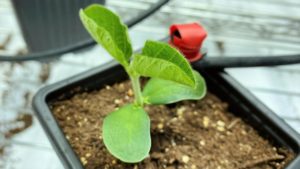Trent University researchers contribute to award-winning online platform
Food security and ensuring a resilient food system are some of the leading challenges of our time.
Two Trent University researchers are helping bring the university into the national spotlight by contributing to FarmFood360°, an award-winning virtual platform that offers Canadians a behind-the-scenes look at how and where their food is produced.

Dr. Ainsely Lewis, a post-doctoral fellow in the Emery Lab, and Daniel Palberg, an Environmental and Life Sciences Ph.D. candidate, are featured in an educational video on how plant genomics have helped counteract issues such as extreme cold, drought, and other natural disasters to ensure a steady food supply for Canadians. Watch “Genomics and Food Security in Canadian Agriculture” here!
Researchers collaborate on breakthrough biofertilizer project
Both researchers are currently conducting their work in the field of biofertilizer, collaborating with the crop-technology company, the NutriAg Group.
The collaboration between NutriAg and the Emery Lab at Trent University has resulted in the creation of M-BOS™, a solution that answers the call for efficient and sustainable plant nutrient solutions.
For more details, see: Collaborative Research Project leads to Sustainable Agriculture Breakthrough.
Dr. Lewis’ primary research investigates how biofertilizer interacts with plant hormones to augment growth, while Daniel uses a custom-built environmental chamber on campus to simulate extreme weather and record the biofertilizer’s efficacy on plants under varying conditions.

According to Martin Yuill, executive director of the Trent University-affiliated clean technology research park, Cleantech Commons, “The development of M-BOS is a perfect example of how collaborative research can lead to new product breakthroughs in key sectors of the economy.”
“Unlike stand-alone sites or industrial parks,” Yuill says, “as a university-linked research park Cleantech Commons provides tenants with ready access to a wide range of value-adding services and supports.”
“These supports are intentionally designed to drive innovation and the commercialization of clean, green, and sustainable technologies through collaboration between both startup and established businesses and the academic, research, and student communities,” he tells us.
The value-added services Yuill cites include cutting-edge resources, research labs and facilities, testing and analytical facilities, academic expertise, business coaching, mentorship, expertise, and networks, collaborative research opportunities, social and recreational amenities, as well as access to a trained workforce, student placements, and experiential learning opportunities.
Lewis and Palberg say their research has been bolstered by Trent’s world-class analytical equipment and laboratories, such as the Water Quality Centre – the most comprehensive mass spectrometry facility in Canada. They also praise the expertise of the University’s faculty.
“You can have all of the instruments in the world, and all of the technical staff to ensure they’re well-functioning but having these experts in our field is what really drives our research forward,” says Daniel.
See also: “Biology Professor Discovers Crop-Boosting Bacteria“

